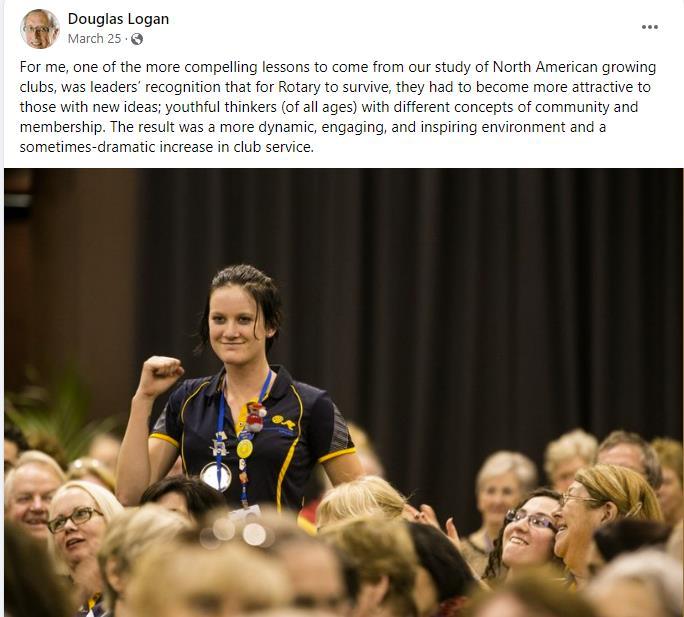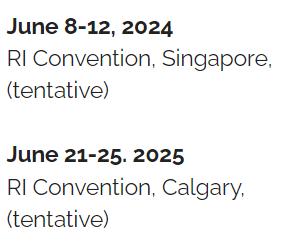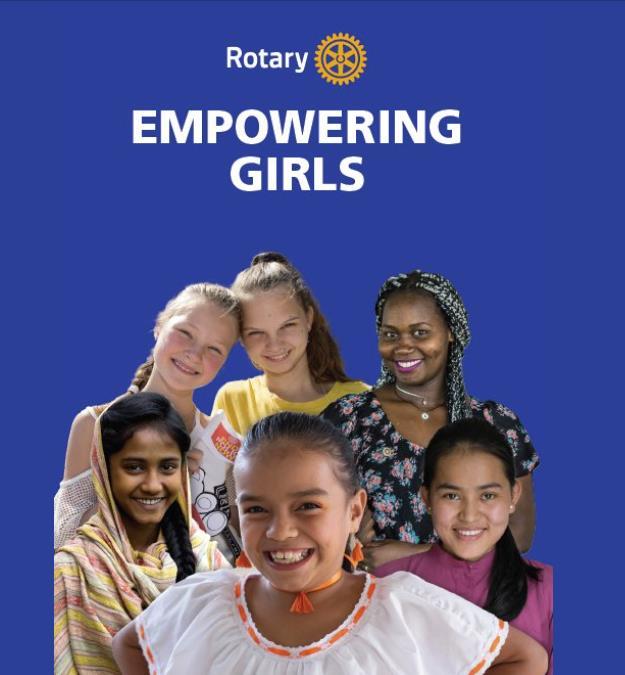
8 minute read
The Beginnings of Rotary –
continued from last month
No Personal Privileges
Advertisement
Do Rotarians receive special business benefits from their rotary membership? Should Rotarians expect a special discount or some preferential service just because they are dealing with a fellow Rotarian? The answer is clearly “No.” The Rotary Manual of Procedure expressly states the rotary position on this matter.
The policy, originally approved by the RI Board of Directors in 1933, is that in business and professional relations “a Rotarian should not expect, and far less should he ask for, more consideration or advantages from a fellow Rotarian than the latter would give to any other business or professional associate with whom he has business relations.”
Over 50 years ago the concept was expressed that “True friends demand nothing of one another, and any abuse of the confidence of friendship for profit is foreign to the spirit of Rotary.” On the other hand, if new or increased business comes as the natural result of friendship created in Rotary, it is the same normal development that takes place outside of Rotary as well as inside, so it is not an infringement on the ethics of Rotary membership.
It is important to remember that the primary purpose of Rotary membership is to provide each member with a unique opportunity to serve others, and membership is not intended as a means for personal profit or special privileges.
Rotary Areas of Focus
For more than 100 years, Rotarians have joined together from all continents, cultures, and industries to take action in our communities and around the world. With a commitment to achieving lasting change we work together to empower youth, enhance health, promote peace, and most important advance the community. While Rotarians can serve in countless ways, Rotary has focused its efforts in seven area, which reflect some of the most critical and widespread humanitarian needs:
• Peace and conflict prevention/resolution
• Disease prevention and treatment
• Water and Sanitation
• Maternal and Child Health
• Basic Education and Literacy
• Economic and Community Development
• The Environment
Rotarians planning new service projects are encouraged to consider these areas and the many opportunities for innovative projects.
The Classification Principle
Virtually all membership in Rotary is based upon a “classification.” Basically, a classification describes the distinct and recognized business or professional service that the Rotarian renders to society. The principle of Rotary classification is somewhat more specific and precise.
In determining the classification of a Rotarian, it is necessary to look at the “principal or recognized business or professional activity of the firm, company, or institution” with which an active member is connected or “that which covers his principal and recognized business or professional activity.” It should be clearly understood that classifications are determined by activities or services to society rather than by the position held by a particular individual. In other words, if a person is the president of a bank, he or she is not classified as “bank president” but rather under the classification “banking.”
The classification principle also permits businesses and industries to be separated into distinct functions such as manufacturing, distributing, retailing, and servicing.
Classifications may also be specified as distinct and independent divisions of a large corporation or university within the club’s territory, such as a school of business or a school of engineering.
The classification principle is a necessary concept in assuring that each Rotary club represents a cross-section of the business and professional service of the community. Members are permitted admission if they are retired, and who had never been in Rotary but would have been qualified. These individuals can be admitted as past service members and are the only Rotarians without a current or former classification.
Limitations. The club shall not elect a person to active membership from a classification if it will result in the classification making up more than 10 percent of the club’s active membership.
Source: https://rotary1.org/101-things-about-rotary/ https://rghf.org/donald-macrae/
The advancement of international understanding, goodwill, and peace through a world fellowship of business and professional persons united in the ideal of service.”
The Fourth Object of Rotary initially composed by Donald MacRae.
Because, as late as 1920, Rotary had been operating under the constitution of the old National Association of Rotary Clubs, changes were deemed necessary to bring Rotary into line with its evolving international character. At the Atlantic City convention in 1920, Halifax Rotarian Charlie Burchell, a member of the Committee on Constitution and By-laws, offered a successful resolution instructing the incoming committee, in 1920-21, to prepare and submit a revised constitution and by-laws in time for the next convention.
The 1921 Rotary Convention, also known as the 12th Rotary Convention, took place in Edinburgh, Scotland, from July 4 to 8, 1921.
Donald MacRae was born in the tiny village of Canoe Cove on Prince Edward Island on 13 June 1872. After graduating from high school, he worked in a clothing store for seven years. In 1894, at the age of 22, he entered Dalhousie University on a scholarship, graduating four years later with high honours in classics and the university medal.
He next spent six years at Cornell University, teaching Greek and earning an A.M. degree in 1899 and a PhD in 1905. Between 1905 and 1909 he lectured in Greek at Princeton University. In 1909 he returned to Canada to study law at Osgoode Hall in Toronto. He graduated in 1912 and was called to the bar in 1913. After practising law for one year in Toronto, he accepted an appointment as Dean of the Law School at Dalhousie University, a position he held until 1924, when he returned to Osgoode Hall as a full-time lecturer. He retired in 1944.
MacRae presented a host of constitutional amendments to the Edinburgh Convention. The most significant one, which has had the greatest long-term effect on Rotary, was a resolution adding the Fourth Object of Rotary.
Drafted by MacRae, himself, it was approved earlier by the Board of Directors. The wording was similar to the present wording:
“To aid in the advancement of international peace and goodwill through a fellowship of business and professional men of all nations united in the Rotary Ideal of Service.”
It is not surprising that MacRae should propose the fourth object of Rotary which now reads:
“The advancement of international understanding, goodwill and peace through a world fellowship of business and professional people united in the ideal of service.”
He had been thinking about it for a long time. In an address to the International Convention in Kansas City in 1918, while World War 1 was still raging, MacRae outlined his philosophy of peace and proposed that Rotary become an agent for the promotion of goodwill and peace among nations – the first time this vision of Rotary was expressed publicly.
In the Kansas City address, MacRae spoke of three kinds of peace. One was the peace of primitive man, which he called barbarism; the second was peace imposed by a world power – imperialism. The third, and to him the most lasting kind of peace, was what he called the “peace of cooperation.” He defined it as “peace founded on goodwill, on sympathy and trust, the peace of free play and fair play.” He urged Rotarians to become involved in creating this kind of peace.
“Goodwill implies sympathy and sympathy and goodwill beget trust,” he said. And then he added:
“On these foundations then, on the foundation of goodwill, sympathy, and trust, to which may we not add, to make it four-square, the Rotarian spirit of service, must we believe, be erected the structure of peace.”
MacRae ended his address with these remarks.
“The ultimate and final security of peace is to be found in individual hearts and minds. The spirit of goodwill, the spirit of sympathy, the spirit of trust, the spirit of service (emphasis added), the new sense of community of purpose, the new sense of unity of life, these are things which must have their birth and growth in the hearts and minds of individual men and women.”
MacRae mulled these sentiments over for three years as he devised a strategy whereby the service ethic of Rotary could be used to create the foundations on which international peace might be built. His strategy was the Fourth Object of Rotary, which he, and he alone, devised. It was fortuitous that he had been appointed chair of the Constitution Committee when he was.
Given the timing, this was a remarkable speech. The sentiments are commonplace today, but to have spoken about peace based on goodwill, sympathy, trust, and service at a time when the peoples of the world were consumed by anger, hatred, and violence was courageous, if not revolutionary.
The sentiments did not end with MacRae’s speech. Soon Rotarians everywhere were speculating that “Rotary was or might be a medium for the promotion of international peace and goodwill … and was particularly emphasized at the 1920 [Atlantic City] convention.
It occurred to MacRae that there was one amendment to the constitution which, though not specifically proposed at the 1920 convention, might nevertheless be proposed for consideration at the 1921 convention. In a letter to James Norton of Moncton, New Brunswick, dated 18 November 1929, MacRae explained the origin of the Fourth Object, which at one time was the Sixth Object.
“The usefulness of international Rotary as an agency in the advancement of international peace and good will had become so apparent, and had been so frequently averted to in the literature of Rotary, and particularly by speakers at the Atlantic City Convention of 1920, that I thought the time had come for formally recognizing this as one of the great objects of International Rotary.
I communicated this suggestion to Chesley Perry, the international secretary, and he laid the matter before the Board of Directors of the I.A. of R.C., with the result that my suggestion was adopted and approved by the Board.
Consequently, I was able to present the amendment at Edinburgh as one offered by the Board and as such it was adopted. … I suppose it can be claimed that the proposal for the recognition of what you in your letter call the “now famous Sixth Object” did originally emanate from myself, though I have little doubt that it would eventually have been the proposed by someone else, if I had not thought of it at the time I happened to be Chairman.”
Before the Edinburgh convention, the Object of Rotary had been limited to domestic affairs. Other than its inclusion in the name of the organization, the word “international” did not even appear in the organization’s constitution or by-laws and not much of its literature. “Service” meant “community service.” “Fellowship” implied only “club fellowship.” But MacRae’s fourth object would change all that.
Rotarians’ commitment to “international understanding and peace” is what distinguishes Rotary from all other service clubs. Cliff Dochterman, a recent RI president updated MacRae’s Fourth Object by explaining how Rotarians promote peace. Dochterman wrote:
“It is the conviction of Rotary International that the lasting peace which the world seeks is built on friendship, tolerance, and goodwill among people. Our instruments of peace are food, education, health care, environmental improvements, respect for all persons, and many other activities we call humanitarian service.”
And so, the Fourth Object was to become the engine that drives Rotary’s international service; it has become the watchword of the Rotary Foundation. All the marvelous international service programs in which we participate can be traced to the Fourth Object – Youth Exchange, Group Study Exchange, World Community Service projects, Scholarships, Health Hunger and Humanity projects, Matching Grants, Peace Forums, and the magnificent PolioPlus program.
Prepared by our Canadian Historian PDG Jim Angus Source: https://rghf.org/the-contribution-of-donald-macrae/
Every year, a Rotarian or Rotary organization is celebrated in each of our Zones for outstanding achievement consistent with the ideals expressed in the Fourth Object of Rotary: “The advancement of international understanding, goodwill, and peace through humanitarian activity of international significance. “
Each Rotary Club and District in Zones 28 and 32 is encouraged every year to nominate a candidate for the Donald MacRae Peace Award. Is this the year for you to honor one of your Rotarians?
Candidates for the awards will have demonstrated the advancement of international goodwill, understanding and peace through peacemaking efforts or humanitarian activity of international significance. The award is open to Rotarians and non-Rotarians, but the applicant must have a relationship with the Club or District that is nominating him/her.
The award honors the contributions of Halifax Rotarian Donald MacRae who, at the International Convention in 1918, proposed that Rotary become an agent for the promotion of goodwill and peace among nations. This was the first time that an international vision of Rotary was publicly expressed.
Upcoming conventions

Click here for a short feel-good video tribute to being young.











